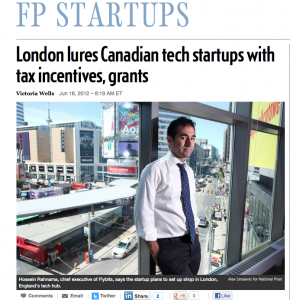Robert Bosch Venture Capital leads $3.75 million Series A round for Flybits
Toronto start-up to advance context-aware mobile experience platform
 TORONTO, Canada (August 20, 2014) — Flybits Inc., a Toronto start-up that has created a context-aware experience development platform for mobile environments, has closed a $3.75 million Series A financing. Led by Robert Bosch Venture Capital GmbH (RBVC) and Trellis Capital Corporation with participation from MaRS Investment Accelerator Fund and Ryerson Futures, Inc., the investment will advance the company’s product development and international growth in the United States and Europe.
TORONTO, Canada (August 20, 2014) — Flybits Inc., a Toronto start-up that has created a context-aware experience development platform for mobile environments, has closed a $3.75 million Series A financing. Led by Robert Bosch Venture Capital GmbH (RBVC) and Trellis Capital Corporation with participation from MaRS Investment Accelerator Fund and Ryerson Futures, Inc., the investment will advance the company’s product development and international growth in the United States and Europe.
This announcement was covered in the National Post, TechVibes, Fortune Magazine‘s Term Sheet Blog (Dan Primack), BetaKit, Yonge Street Media and PEHub.
Since spinning off from Ryerson University in 2012, Flybits has raised a total of $4.05 million to date, including a seed round from MaRS Innovation. Flybits technology has been used in developing smarter cities, connected stadiums, smart corporate campuses, shopping malls, conference venues and even fashion shows. The company also concurrently incubated its technology at the Ryerson Digital Media Zone in Toronto and Vodafone Xone in Redwood City, California.
“Flybits is RBVC’s first investment in Canada,” said Luis Llovera, managing director of Robert Bosch LLC based in Palo Alto, California. “The company has demonstrated a unique and innovative approach in building foundational technology to deliver Contextual Mobility Services for both display-driven devices and for the emerging Internet of Things applications. Flybits’ strong roots in tangible and high impact R&D, their ability to predict the required infrastructure for the industrial Internet and their global entrepreneurial ambitions were some of the reasons we were attracted to this company.”
“Involving high-quality investors such as Bosch and Trellis demonstrates the potential in our unique approach to designing Intelligent Mobility Solutions that are intuitive and scalable,” said Dr. Hossein Rahnama, CEO and founder of Flybits. “In particular, having Bosch as a strategic investor means we leverage their global expertise in software automation, connected communities and sensor technologies as we support new and existing international customers, and scale and develop both our team and our products.”
“Recognizing the Flybits’ platform potential to create next-generation mobile experiences at an early stage, MaRS Innovation worked closely with Flybits to launch the company and secure initial market traction,” said Dr. Raphael Hofstein, president and CEO of MaRS Innovation.







